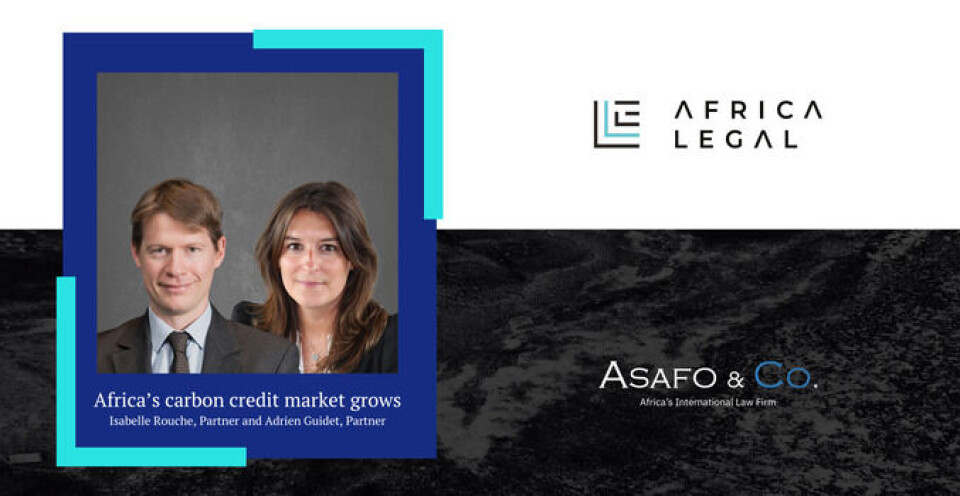Copyright : Re-publication of this article is authorised only in the following circumstances; the writer and Africa Legal are both recognised as the author and the website address www.africa-legal.com and original article link are back linked. Re-publication without both must be preauthorised by contacting editor@africa-legal.com
Africa’s carbon credit market grows

Africa is helping lead the way on global carbon offsetting projects, and law firms have a key role to play in marshalling engagement with local stakeholders, say Isabelle Rouche and Adrien Guidet who spoke to Ben Edwards.
As many African governments seek ways to transition to a low carbon economy, the African carbon credit market is growing, with the continent accounting for around a fifth of the world’s carbon credit projects, says ASAFO & CO. partner Isabelle Rouche.
This is because most African states have either already adopted a legal framework for carbon credits or are in the process of putting regulations in place, although those regulations tend to vary depending on how jurisdictions deal with property rights.
“Common law and civil law systems define property in very different ways,” said Rouche. For instance, some countries such as Zambia, Gabon, the Democratic Republic of Congo and Mozambique, have adopted regulations that say carbon stocks in forests are owned by the state, and the state can grant user rights to forest management groups, Rouche explained.
Other states, such as Ghana, have a more legally “pluralistic environment where land rights and tenures are administered in a plural legal environment, with customary laws and norms operating alongside statutory ones,” she said.
While Africa has been helping lead the way on carbon offsetting projects, the global carbon credit market is currently on hold as policymakers discuss how offsetting rules under the Paris Agreement can avoid the pitfalls that had plagued the previous mechanism under the Kyoto Protocol. One key flaw is the issue of double counting, which makes it seem like more progress is being made on carbon reduction efforts than is really the case.
“Under the Kyoto Protocol, you could transfer some carbon credit units to private or public entities and there was a challenge to make sure that the ones that were transferred were erased from the account of the state or company that made the transfer,” said Rouche. “The Kyoto Protocol suffered from mistrust from investors and the financial community, so the new legal framework has to minimise this mistrust and this is why the legal community is working towards something that is more reliable.”
In addition to helping develop that framework, lawyers are also playing an important role in supporting the development of the African carbon credit market, not least because of the need for advice on international law, public law, commercial and contractual law, land law and more, noted Adrien Guidet, a partner at ASAFO & CO.
“You need multi-disciplinary teams with international and local perspectives to navigate the carbon credit market in Africa. At ASAFO & CO. we are fortunate to have the support of international teams with the right skill sets for carbon credit related projects and transactions, as well as the unique on the ground experience of our teams working in Africa where the projects are implemented.” he said.
Law firms are also playing a key role in financing African carbon credit projects.
“Getting a carbon project accredited and validated can be a very long and costly process, especially in Africa, therefore many sponsors need upfront capital to launch the project and manage the delay of carbon revenue,” Guidet explained.
ASAFO & CO. helps sponsors arrange pre-financing agreements with financing partners who finance the feasibility studies and take on the project risk and then receive a share of the revenue on the sale of carbon credits once the project is up and running.
Carbon offsetting projects typically involve initiatives such as marine protection, reforestation and soil restoration. While these projects benefit the public or private entities seeking to offset their carbon emissions, they can also have wider benefits for other stakeholders where the underlying projects are located. A marine protection project, for instance, can benefit coastal communities through improved fish stocks and more sustainable tourism.
“One of the key issues of this process is to make sure that the projects have a positive impact, especially for local communities, and this is something that we pay close attention to with our clients,” said Rouche.
To join Africa Legal's mailing list please click here
